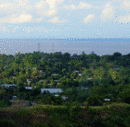Nouvelles

Forests sequester carbon, support the livelihoods of 1.7 billion people and act as vital reservoirs for biodiversity. However, as a valuable resource, forests have frequently been the spark that ignites conflict among multiple stakeholders having divergent priorities for the same landscape. When one group — whether inadvertently or deliberately — withholds access to a forest resource or to the decision-making process from another user group, non-violent or violent conflict is more likely. Conflict can also lead to the inequitable distribution of benefits, disputes over land rights and access, and a lack of engagement with the forest management process. It is estimated...

The 2017 United Nations Climate Change Conference (COP23) highlighted climate change-related challenges small-island developing state face on a daily basis. The Solomon Islands, a double chain of islands located in the southwest Pacific, is not a stranger to such challenges. Exposure to natural hazards influences greatly the country’s ability to reach Suitable Development Goals (SDGs) and be resistant and prepared for an always-greater susceptibility to climate change. As is widely known, forests can significantly mitigate natural disasters at the same fighting climate change with its carbon sequestration potential. Recognizing forests’ potential, the Solomon Islands has embarked on a challenging journey...

On 16 July 2018, government representatives, civil society and international organizations gathered for the high-level side event co-hosted by Poland’s Presidency for COP24 and FAO entitled “Implementing Article 5 of the Paris Agreement and achieving climate neutrality through forests”. It took place during the 6th World Forest Week at FAO Headquarters in Rome, Italy and highlighted the catalytic and driving role of forests in strengthening efforts to implement the Paris Agreement.Article 5 of the Paris Agreement invites countries to take action to conserve and enhance sinks and reservoirs of greenhouse gases, including forests. The article also encourages actions to implement...

On 18 July 2018, institutional representatives gathered during the 6th World Forest Week in Rome, Italy at FAO Headquarters to attend an event entitled “Common Ground: multipurpose land-use planning for halting deforestation”. The event explored how participatory land use planning, can tackle the multi-sectoral drivers of deforestation and degradation. Panellists included government officials from Brazil, Indonesia, and Mexico, alongside representatives from United Nations Convention to Combat Desertification, UN Environment and the International Fund for Agricultural Development discussed how to scale up best practice for land-use planning.
Land is a scarce resource increasingly affected by competition of mutually exclusive uses. Fertile land...

The Food and Agriculture Organization of the UN (FAO) and Norway’s International Climate and Forest Initiative (NICFI) have announced plans to scale up a digital FAO platform that assists countries in measuring, monitoring and reporting on forests and land use. The initiative is expected to contribute to the conservation and sustainable management of forests and increase accuracy and transparency in forest monitoring.
Read more from the International Institute for Sustainable Development's SDG Knowledge Hub.

